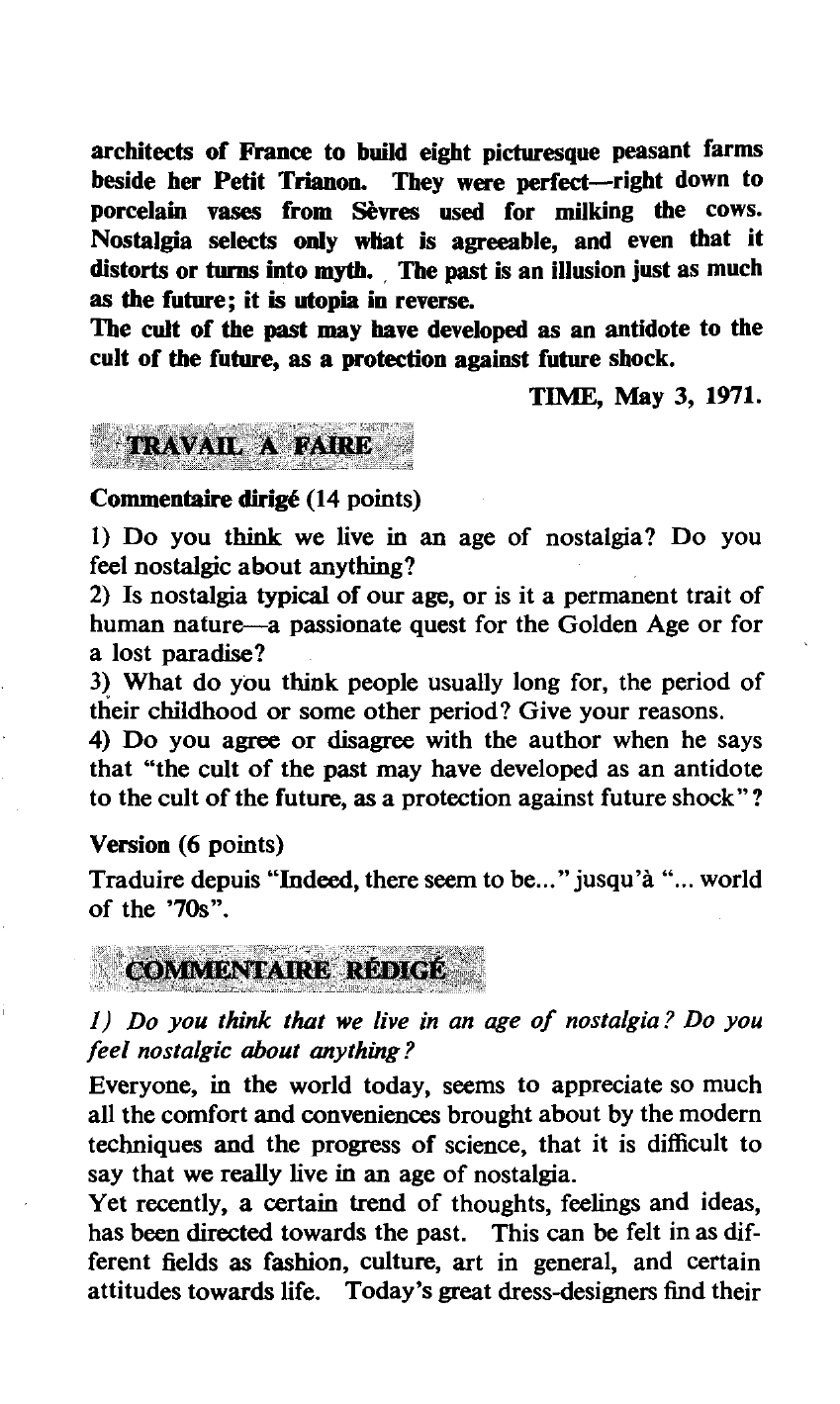THE MEANING OF NOSTALGIA
Publié le 07/02/2012

Extrait du document
The original definition of nostalgia, which few recognize today,
is "homesickness". Dlogical though it may be, many people
in their 20s and 30s (1) do feel a longing (2) very much like
homesickness for a time they never knew. lndeed, there seem
to be two kinds of nostalgia, one for youth and one for middle
age and beyond. Most often, those who were adults in the
ancient days before 1960 glanee back with either fondness or
sadness, but rarely with bitter regret. They look at the
past with the secret sense of triumph that comes to ali survivors.
It is tbeir children, members of a supposedly radical generation,
who genuinely hunger for unexperienced past, as if they were
hearing some melancholy automnal horn summoning (3) them
to a place they cao search for but cao never &nd. It is as if
they f'elt cheated for being given their maturity in the sad and
sinister world orthe '70s. For them, as for Wordsworth, there
truly "bath passed away a glory from the earth ".
«
architects of France to build eight picturesque peasant farms
beside ber
Petit Trianon.
They were perfect-right down to
porcelain vases from Sèvres used for milking the cows.
Nostalgia selects only wliat is agreeable, and
even that it
distorts or turns into mytb.
, The past is an illusion just as much
as the future; it is utopia in reverse.
The cult
of the past may have developed as an antidote to the
cult
of the future, as a protection against future shock.
TIME, May 3, 1971.
Commentaire
dirigé (14 points)
1) Do you think we live in an age of nostalgia? Do you
feel nostalgie
about anything?
2) Is nostalgia typical of our age, or is it a permanent trait of
human nature-a passionate quest for the Golden Age or for
a lost paradise?
3) What do you think people usually long for, the period of
ti:Ïeir childhood or sorne other period? Give y our reasons.
4)
Do you agree or disagree with the author when he says
that "the cult of the past may have developed as an antidote
to the cult
of the future, as a protection against future shock" ?
Version (6 points)
Traduire depuis
"Indeed, there seem to be ...
" jusqu 'à " ...
world
of the '70s".
1) Do you think that we live in an age of nostalgia? Do you
fee/ nostalgie about anything?
Everyone,
in the world today, seems to appreciate so much
all the comfort
and conveniences brought about by the modem
techniques and the progress of science, that it is difficult to
say
that we really live in an age of nostalgia.
Yet recently, a certain trend of thoughts, feelings and ideas,
has been directed towards the past.
This cao
be felt in as dif
ferent fields as fashion, culture, art in general, and certain
attitudes towards life.
Today's great dress-designers find their.
»
↓↓↓ APERÇU DU DOCUMENT ↓↓↓
Liens utiles
- Canada's Constitution Act of 1982 In 1982 the Canadian constitution was patriated, meaning it was brought further under Canadian control.
- Nemesis Greek Goddess of vengeance; personification of the wrath of the gods toward those who had hubris, a Greek word meaning exaggerated pride in one's achievements or good fortune.
- IDÉE DE VÉRITÉ (L’) - [The Meaning of Truth] de William James
- exposé anglais introduction to the Consumer Society
- Le théâtre a-t-il pour fonction de tout dire, de tout expliquer au spectateur de la crise que vivent les personnages? - Par quels moyens et quelles fonctions Juste la Fin du monde est une pièce qui nous retrace la crise de cette famille?


